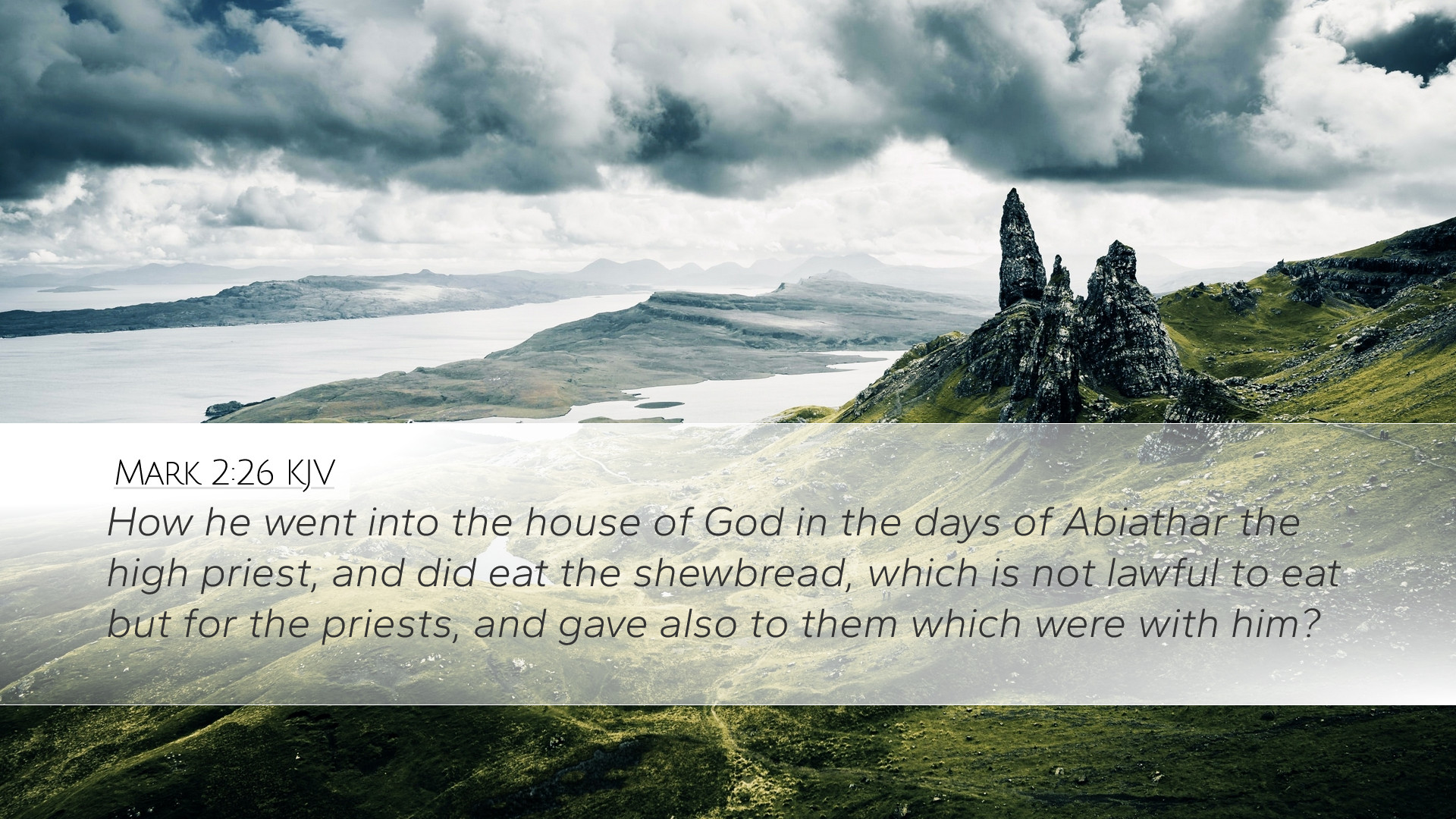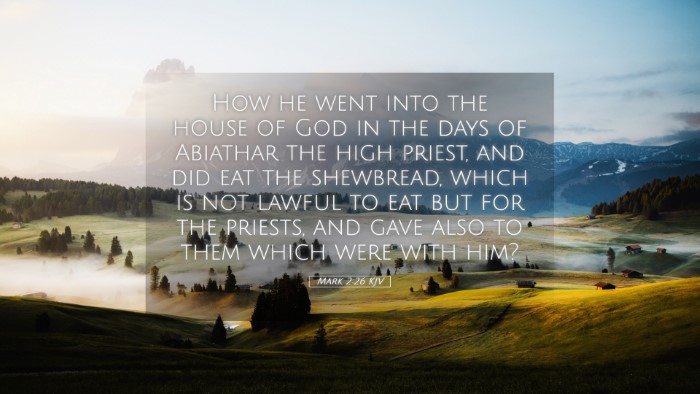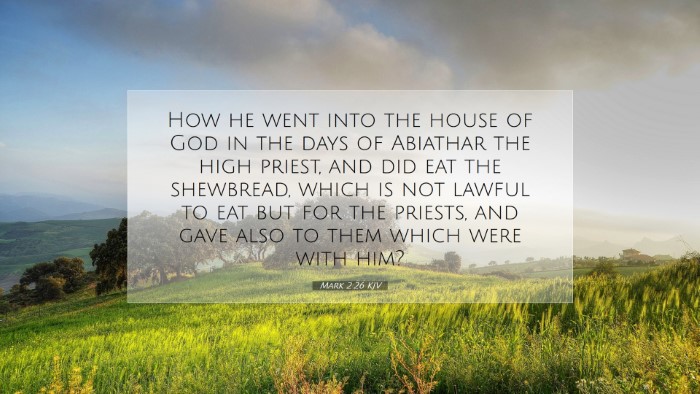Old Testament
Genesis Exodus Leviticus Numbers Deuteronomy Joshua Judges Ruth 1 Samuel 2 Samuel 1 Kings 2 Kings 1 Chronicles 2 Chronicles Ezra Nehemiah Esther Job Psalms Proverbs Ecclesiastes Song of Solomon Isaiah Jeremiah Lamentations Ezekiel Daniel Hosea Joel Amos Obadiah Jonah Micah Nahum Habakkuk Zephaniah Haggai Zechariah MalachiMark 2:26
Mark 2:26 KJV
How he went into the house of God in the days of Abiathar the high priest, and did eat the shewbread, which is not lawful to eat but for the priests, and gave also to them which were with him?
Mark 2:26 Bible Commentary
Commentary on Mark 2:26
Mark 2:26 states: "How he went into the house of God in the days of Abiathar the high priest, and did eat the shewbread, which is not lawful to eat but for the priests, and gave also to them which were with him?" This passage is significant within the broader context of Jesus' ministry and his challenge to the prevailing religious norms of the time. Below, we explore various insights drawn from well-respected public domain commentaries.
Contextual Analysis
This verse comes from the narrative where Jesus is being questioned about his disciples' actions on the Sabbath. The event recorded here relates to King David, who, in a time of need, ate the showbread reserved only for priests, which raises important theological implications about the nature of law and mercy.
Matthew Henry's Commentary
Matthew Henry emphasizes the importance of mercy over mere ritualistic adherence to the law. He interprets this instance as illustrating the greater principle of human need prevailing over ceremonial law. Henry states:
"David acted in a case of necessity, and Christ's disciples now were in the same circumstances; it was a solemn occasion, and it justified the disciples' actions."
Henry further elucidates that David’s example reflects a more profound understanding of God’s heart – one that prioritizes compassion and human necessity above rigid legalism.
Albert Barnes' Commentary
Albert Barnes provides a detailed analysis of the historical context, noting that Abiathar was the high priest during the time of David's need. Barnes comments:
"This incident in David’s life serves to illustrate a principle in relation to the law and the observance of its precepts."
He stresses the significance of the showbread, pointing out that it symbolizes God's provision and the priority of divine mercy over sacrificial law observance. Barnes also highlights that Jesus cites this instance as a rebuttal to the Pharisees’ legalistic attitudes.
Adam Clarke's Commentary
Adam Clarke offers a thorough examination of the particular laws surrounding the showbread. He remarks that:
"The shewbread was not allowed to be eaten by anyone but the priests, yet in a case of extreme necessity, even these rules may be set aside."
Clarke connects the legality of David's actions with Jesus’ argument, showcasing how divine mercy supersedes human laws. He points to the heart of the law, which is love and necessity, rather than rigid adherence to rules that do not consider human circumstances.
Theological Implications
Examining this verse offers profound insights for pastors, students, and scholars alike regarding the interplay between law, grace, and mercy:
- Human Necessity and Divine Provision: The actions of David illustrate that during times of hardship, divine grace is extended beyond traditional boundaries.
- Jesus as the Fulfillment of Law: This example provided by Jesus asserts His authority to interpret the law in the light of compassion and human need.
- Challenge to Legalism: The reference to the shewbread serves as a theological critique against the Pharisees’ rigid interpretations of law, advocating for a principle that prioritizes mercy.
Practical Applications
For modern readers, especially those in pastoral care or theological study, Mark 2:26 encourages reflective engagement with the text in the following ways:
- Understanding God’s Nature: Recognize that God's laws are ultimately founded in love and compassion.
- Ministry and Compassion: In ministry, leaders are called to prioritize human dignity and needs above strict adherence to traditions that may hinder mercy.
- Contextual Theology: Seek to understand biblical laws within their historical-religious contexts, and apply the principles of grace to contemporary situations.
Conclusion
Mark 2:26 serves as a powerful reminder of the heart of God in relation to humanity. The reflections from Matthew Henry, Albert Barnes, and Adam Clarke collectively illustrate how the principle of mercy over ritualistic law is not only a theme in Jesus’ ministry but a vital aspect for contemporary faith practice. As believers engage with this scripture, they are encouraged to embody the same compassion and understanding that Jesus exemplified, reaffirming the significant theological truth that God desires mercy, not sacrifice.


